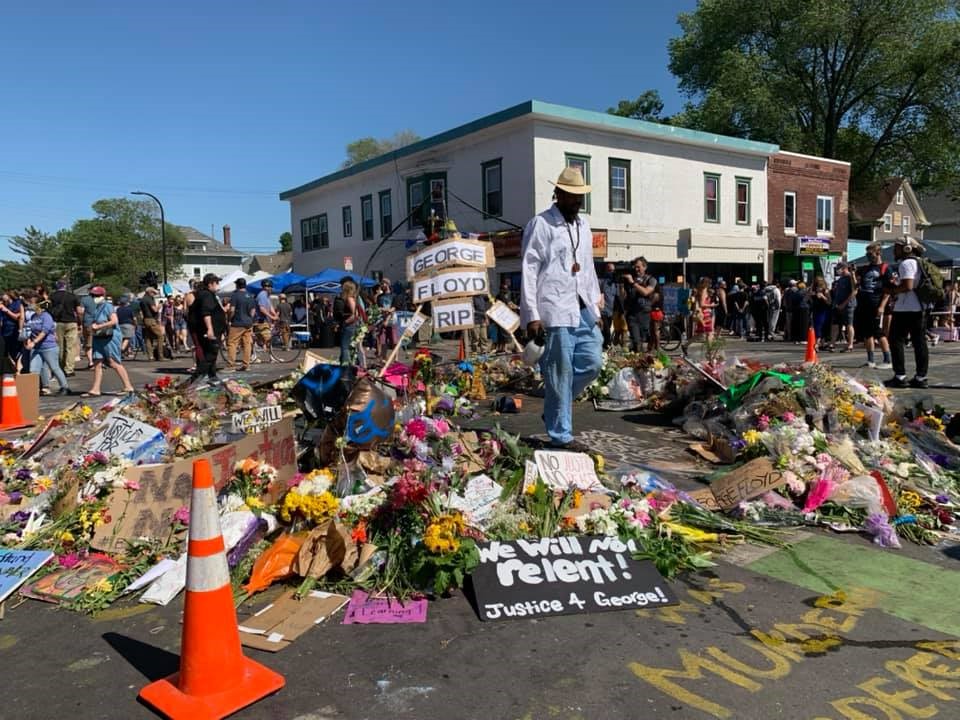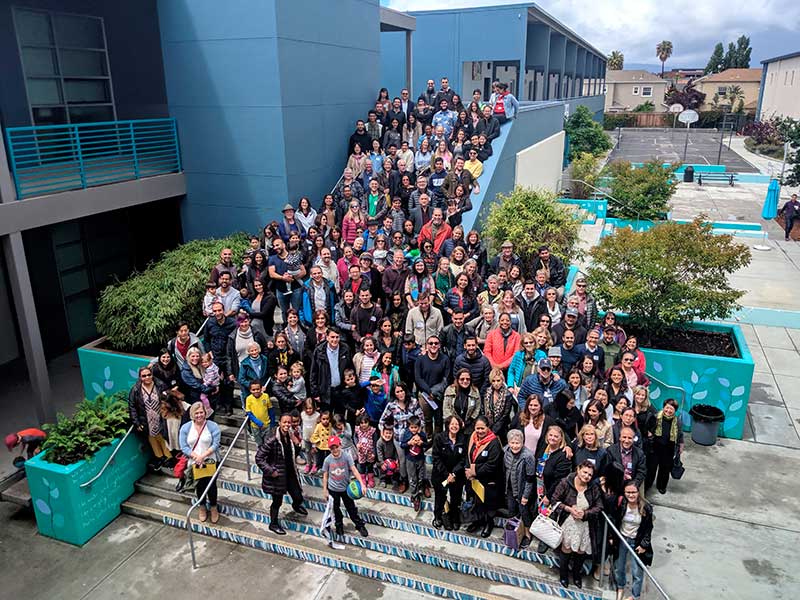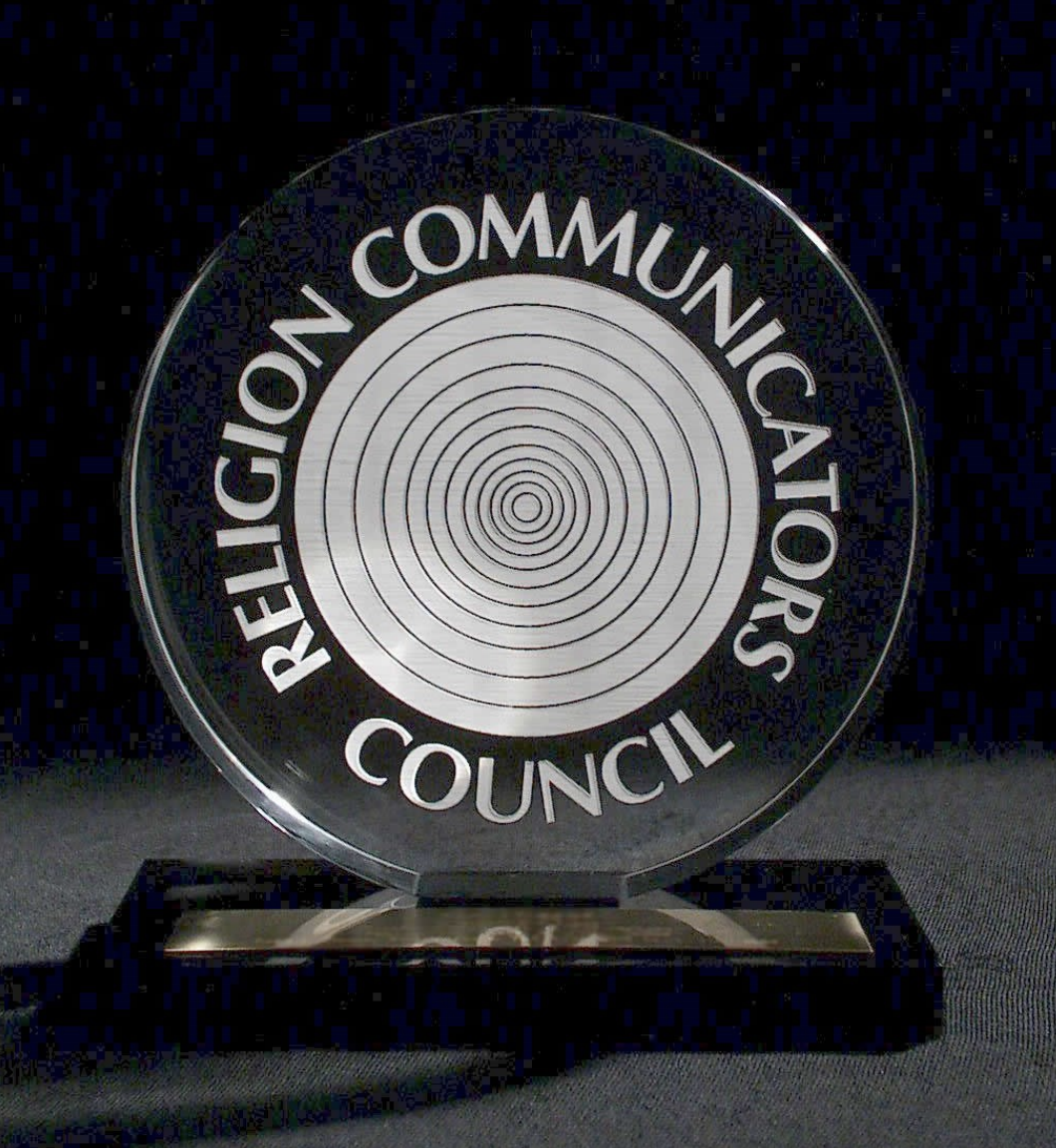
South Minneapolis Baha’is becoming one with neighbors

Story and photos by Kari Carlson
Author’s note: I’m originally from St. Paul, Minnesota, just across the Mississippi River from where George Floyd was killed on May 25, 2020. The COVID-19 pandemic brought me back to town in mid-March, after 24 years away. I was here “just in case anything happened” to my family during the pandemic.
In the events that followed the tragic killing, I discovered what “just in case” meant. Something happened, not to my family, but to my hometown. That something has been building my whole life, in the systems that prevent many Black Minnesotans from experiencing parity in education, their professional lives, income, housing and treatment by police. I began working for racial justice when I was a teenager here because I witnessed firsthand what racism does to systems and relationships and I’m grateful to be in town at this critical time.
However, in the telling of this story — the story of South Minneapolis — I center the voices of my Baha’i peers. These friends — some I’ve known my whole life, others I’ve only just met — are working night and day, seven days a week to be with their neighbors during a painful and potentially transformative time.
When it comes to working toward racial justice and unity, Baha’is often speak about transformation at the neighborhood level — the building of new systems and patterns of behavior to replace faulty ones. The Minneapolis Baha’is offer a stunning, real-time example of what it looks like to listen to people of color and to move organically toward transformation in step with neighbors.
Intersection of hope

An intersection of hope. This is how residents of South Minneapolis now lovingly refer to the site where George Floyd died, at the corner of East 38th and Chicago avenues. The site is familiar to news audiences, as the heart of what mobilized people around the globe to express their desire for justice in May and June 2020.
The news cameras have mostly left. But this intersection of hope is now a vibrant gathering point for thousands of people of different racial backgrounds and belief systems who come to grieve, protest, create art and heal. Among them are American Indians, African Americans, Somalis, West Africans, Latinx, Whites and Amish.
Here you can glimpse the power of community — of what a multiracial, multicultural collective can create when given the space to take ownership of its own community. In the center of the intersection stands a newly erected sculpture of a Black fist raised in the air, encircled by bouquets of flowers, messages painted directly on the asphalt, and a growing number of murals on the walls of businesses. A stage stands on one edge of the intersection, where various people speak or perform music and dance.
As Rebecca Molloy, a Twin Cities-area Baha’i, puts it, “It’s probably the most peaceful and unified place on earth. The artwork spontaneously shows up. Neighbors cook free food for everyone. There are multiple food drives. Everyone wants to give something to their city and neighbors.”
Nadia Ayoubzadeh grew up just blocks away from 38th and Chicago. She arrived at the intersection of hope with her husband and children on the Saturday following George Floyd’s death. This was after several nearly sleepless nights, when fires overtook an entire commercial district where many people of color own businesses. Families were on guard against unwanted visitors intent on doing harm and military helicopters hovered overhead.

“Before I visited the intersection,” says Ayoubzadeh, “I felt sorrow and pain and a heaviness in my heart. As I approached the memorial, those feelings washed away and I felt a sense of peace. People praying, bringing flowers. It was like the moment in an action movie when everything goes silent. Sorrow and joy merged together — the earthly sadness of injustice and a yet spiritual power.”
Ayoubzadeh’s husband, Everett, says, “African Americans on that block haven’t had time to grieve because the whole world has flooded to them. They’re up 20 hours a day, trying to unify people around the space while maintaining protection and dignity. They all recognize the value of the space as a global symbol of racial healing.”
Everett Ayoubzadeh has been meeting with grassroots leaders twice a day, to ensure the Baha’i community remains in sync with them.
Organic growth: One small act blossoms
The Minneapolis Baha’i Center is exactly one block away from the intersection of hope. The Baha’is purchased the building 20 years ago. Until recently, they have struggled with how to be a part of the neighborhood in a meaningful way. But that has started to change as hundreds of people walk past the Center each day and as Baha’is enter the memorial area to connect with their neighbors.
Amir Missaghi, who lives in a nearby suburb, felt called to the area while watching news coverage of George Floyd’s death and the resulting protests. On TV, he could see the now-famous Cup Foods sign, something he’d glimpsed from the Baha’i Center lawn numerous times.
“I felt an internal struggle,” Missaghi says. “My wife and kids and I had been sheltered-in-place for six weeks and weren’t sure if we should leave the house. But I kept re-reading a letter from the Universal House of Justice (the international governing council for the Baha’i Faith) that came out a week before, and it said, ‘Be ready to be of service to your community.’
“I knew that the protesters were at that intersection fighting for justice, which is something I could get behind,” he continues. “My mind also kept going back to ‘Abdu’l-Baha (the leader of the Baha’i Faith at the turn of the last century). He brought food to the British during World War I. I thought, if He did that, I can bring water to the protesters.”
Missaghi started by passing out granola bars and bottles of water. Then he called on other Baha’is to set up a table on the lawn of the Center for those simple offerings, plus face masks. Soon, people they didn’t know brought bags full of groceries to the table. At first, the Baha’is graciously turned them away, saying, “The food drives are a block down.”

But the strangers kept coming, all with bags and boxes full of groceries and basic necessities, so the Baha’is decided to accept them. Within days, the donations grew to require several tables on the lawn, set up like a free open-air market. Several more tables inside the Center hold stock. At no point was this spontaneous food drive advertised.
There’s a practical explanation. Missaghi’s wife, Tajalli, explains, “The road is blocked to vehicle traffic at the edge of the Baha’i Center parking lot. The Baha’i Center is the closest they can get to the memorial by car. You can either turn into the Baha’i Center or turn around.”
Neighbors becoming one, together
Not everyone who shows up at the Center has a car full of supplies. Some just have a desire to serve. The Baha’is make sure each person has a role to play.
The inclusion of any and all willing volunteers caught the attention of the neighborhood associations keeping watch over George Floyd’s memorial site a block down. Since thousands of people are entering a community of color during a pandemic that has disproportionately affected people of color, Black and American Indian leaders set up tents at all entrances to the intersection, where they pass out masks and hand sanitizer. They also use the tents to orient those who enter the space to the desired air of dignity and respect. They soon asked the Baha’is to coordinate all volunteers for all of the tents.
Minneapolis Baha’i Andy Hartin says welcoming people into the area reminds him of a previous period of service in his life: “It feels like I’m back in India guiding at the Baha’i House of Worship. I’m welcoming people into a peaceful, reverent space that is intended for people of all backgrounds.”
New friendships are emerging as Baha’is serve alongside area residents, and as a result the Baha’is have shifted their approach to service. After two weeks, neighborhood leaders expressed concern that the transactional nature of the food drive changed the atmosphere of the intersection of hope. Now the Baha’is are turning to the established nonprofits in the neighborhood, asking how they can help meet the material, emotional and spiritual needs of residents.
Many volunteers — Baha’is and new friends alike — serve the area around the clock. So the Baha’is created a 10 a.m. devotions and reflection space. And rather than make decisions on their own, they’ve invited neighborhood leaders to join in consultation.
Everett Ayoubzadeh says, “We invited one woman who leads a nonprofit to stop by anytime. So she came to our morning devotions and consultation. It turns out, she had exactly the answers we needed in the moment.”
Hartin says the willingness to change approaches is about oneness. “It’s not everyone becoming one with the Baha’is,” he explains. “It’s us becoming one with our neighbors. It’s all of us becoming one together.”
The events that have unfolded since the death of George Floyd, he goes on, have “lifted a veil between the Baha’i community and the community around us. All these veils lifted right along with his soul.”





